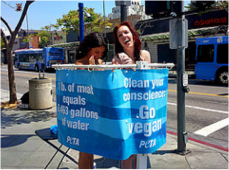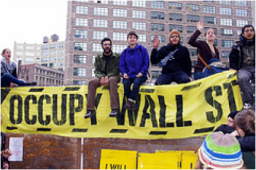By Deana A. Rohlinger



Posted in Flickr Creative Commons by Neil Cooler
We spend a lot of time evaluating reputation. We research the reputation of a manufacturer before buying a car, investigate the reputation of a neighborhood before renting a home, and carefully consider the reputation of an individual before deciding to act on his/her professional advice. Despite the importance of reputation in everyday life, we largely have ignored its influence on the course and outcomes of social movements.
Activist groups mobilizing around a shared, general goal rarely stand as equals, shoulder-to-shoulder, united against an authority. Ultimately, a target decides which group to deal with and a social movement organization’s reputation, or, among other things, the ability of a group to meet the institutional norms of its target, is a critical factor in its decision-making.1
Activist organizations are more or less aware of their reputations with a target (although they may not always use this term) and incorporate this knowledge into their strategic calculus. Generally speaking, a group with a strong reputation will have more tools in its strategic tool belt than an organization with a weak reputation. A group with a strong reputation, for instance, may get an audience with (or concessions from) a target with threats alone, while a group with a weak reputation may stage well-attended, public actions that barely elicit a response.
Let’s use mass media to explore how reputation affects the strategic decision-making of movement organizations in more detail.
Activist groups target mass media for a variety of reasons, including the desire to grow their ranks and to shape public debate and opinion on an issue. Their reputations will determine how they are able to do so. Mass media are diverse so let’s begin with mainstream news. An activist group with a strong reputation has plenty of opportunities to get media attention for its issue, which means it has more occasions to get “good” coverage for the organization.
A strong reputation has other strategic benefits as well. For example:
• It enables an organization to shape news coverage on an issue. This consists of more than being cast publicly as “the voice” of a movement. A group in this position can offer new angles on “old” issues and even throw media coverage to a qualified ally, who can provide “movement friendly” expertise on a cause.
• It allows a group to avoid rancorous public debate on losing movement prospects. Most activist groups find themselves painted into the proverbial corner at some point. Their opponents come up with a proposal (legislative or otherwise) that is wildly popular with the public and is a clear defeat for a movement. An organization with a strong reputation will be able to largely avoid the public conversation – e.g., it may provide journalists a generic statement that is only tangentially related to the debate at hand – and work behind the scenes to defang the proposal.
• It buffers against crises and scandals. A group may find itself the topic of media coverage in less than desirable ways (e.g., Greenpeace’s financial snafu last summer). While an activist organization will be hard pressed to avoid some reputational decline, it will be better positioned to make its case to the public. For example, it can offer a diagnosis and prognosis for the scandal and to remind the public of its history and successes.


Posted in Flickr Creative Commons by David Blaikie
An activist group with a weak reputation obviously has fewer opportunities to get media attention for its issue, which affects an organization’s strategic decision-making. For example:
• Activists have to decide how negative “bad” media attention is for the organization. A group with a weak reputation often has to settle for the mainstream media scraps – e.g., the yelling matches featured on cable news – which doesn’t always cast the movement or the organization in a positive light. Given the limited chances to get coverage, a group must decide what benefits (if any) it gets from bad coverage.
• Groups have to view losing movement prospects as a media opportunity. Since organizations with a strong reputations often avoid rancorous debates, these moments become the best opportunities groups with weak reputations have to get their ideas included in coverage. These are not ideal circumstances; after all, a group essentially is telling the public that their opinion on a popular proposal is misguided. While some segment of the public will sour on the activist group, it can use forceful rhetoric and dramatic tactics to mobilize sympathizers to action on behalf of its cause.
• Organizations have to find ways to make unique media opportunities. Groups with weak reputations can find ways to turn a headline into a movement issue. This is easier said than done. If the headline clearly falls into movement terrain (e.g., a Supreme Court decision or policy proposal), than organizations will likely lose out to their more reputable allies. The trick is to find a headline that is tangentially related to a movement and attach it to the agenda of the activist group so that it appeals to media professionals.


Posted in Flickr Creative Commons by jvoves
Mainstream news media are not the only venues available to activists. While scholars tend to study how groups target mainstream, sympathetic, and social media separately, organizations use these outlets simultaneously and their reputation affects how they do so.
A movement group with a strong reputation, for instance, is unlikely to spend much time pushing their ideas in outlets that are sympathetic to its cause, while an organization with a weak reputation might focus most of its attention here. As I detail in my book and elsewhere, media reputation and political reputation are linked, but mainstream media is not the only way to build (and exercise) political clout. A savvy organization can use sympathetic newspapers, magazines, and online forums to create a public ruckus as well as to build a following and a desirable political profile.
Reputation also shapes how movement organizations use social media. Since this is the topic of my current research, which I will be presenting this summer, I will just say that groups with a strong reputation use social media (such as Twitter) to connect with their followers much more often than organizations with weak reputations – which largely use social media to pitch their causes, campaigns, and groups to (hopefully) new audiences.


Both pictures posted in Flickr Creative Commons by David Shankbone
Does reputation matters for grassroots movements like Occupy or clandestine groups like Earth Liberation Front?
Yes, it does.
All groups face the same basic dilemmas when it comes to targeting mass media; one of which is the dilemma of engaging mainstream outlets. Groups that take on the mainstream media challenge may find that – absent like-minded or similarly structured organizations – journalists compare them to the reputable groups with whom they dealt with in the past. These comparisons are unlikely to help grassroots movements and clandestine organizations in their quest to spread their ideas without critique or additional commentary.
Reputation, in short, is not a construct limited to commercial or personal decisions. Reputation affects who activists target, how they do so, as well as how targets respond. This is something we should consider seriously when exploring the course and outcomes of a social movement.
1For a more detailed explanation, which includes how movement density and dynamics affect reputation, see Abortion Politics, Mass Media, and Social Movements in America

Reblogged this on Deana's Blog and commented:
Check out my new post in Mobilizing Ideas!
LikeLike
Kind of interesting in tandem with the Everson post on bystanders. I noticed you included an image from PETA, which I would argue has a pretty terrible reputation in the eyes of the public. However, PETA enjoys hegemonic control over the animal rights movement, with few activists (outside of the marginalized radical flanks) open to any criticism of its tactics. In other words, reputation can manifest in contradicting ways in bystander publics and activist spaces.
LikeLike
Agreed! PETA doesn’t have a great reputation, which is why I included the picture. I am not sure what you mean by hegemonic control and would be interested in your thoughts on this. It seems to me that PETA may be able to attract (negative) media attention, but that it doesn’t have much political clout (although it has done better in recent years targeting food companies).
LikeLike